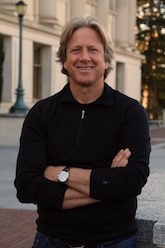
I was born in Jalisco, Mexico, the offspring of two early members of the counterculture. My mother, a literature professor, and father, an artist, raised my brother and me in Laurel Canyon in the late 60s, where those North Hollywood hills were filled with revolution. When my mom secured her first job as a professor in 1970, we moved to a conservative town in the foothills of the California Sierra Nevada (in my 7th grade social studies class, I represented the North’s side in a debate about the Civil war, and was declared the loser by my teacher from Tennessee). I received my BA from UC Santa Barbara in 1984 and PhD in Social Psychology from Stanford University in 1989. After a post-doc at UCSF with Paul Ekman, in 1992 I landed my first academic job, at the University of Wisconsin-Madison, and then returned to Berkeley’s Psychology Department in 1996, where I am now a full professor, and faculty director of the Greater Good Science Center (greatergood.berkeley.edu).
My research focuses the biological and evolutionary origins of compassion, awe, love, and beauty, and power, social class, and inequality. I am the co-author of two textbooks, as well as the best-selling Born to Be Good: The Science of a Meaningful Life, The Compassionate Instinct, and most recently, in May 2016, The Power Paradox: How We Gain and Lose Influence. I have published over 190 scientific articles, and written for the New York Times Magazine, The New York Times, The London Times, The Wall Street Journal, SLATE, and Utne Reader, and received numerous national prizes and grants for his research. My research has been covered hundreds of times, including in TIME, Newsweek, the New York Times, the BBC, CNN, NPR, The Wallstreet Journal, and in many other outlets.
My Science of Happiness MOOC at EdX has had over 300,000 enroll. I have received the outstanding teacher and research mentor awards from UC Berkeley, and seen 20 of his PhD students and post-doctoral fellows become professors. WIRED magazine recently rated my podcasts from his course Emotion as one of the five best educational downloads, and the Utne Reader selected me for one of its 50 2008 visionaries. I also serve as the Faculty Director of the Berkeley Greater Good Science Center (http://greatergood.berkeley.edu).
In the past several years I have had the great fortune of translating my science to projects out in the world. I was a scientific consultant on Pixar’s film Inside Out (https://en.wikipedia.org/wiki/Inside_Out_(2015_film). I have for three years worked with Facebook engineers and designers to make the site more kind, worked on projects at Google on altruism and emotion, and was recently featured in Tom Shadyac’s movie I Am. I am collaborating with the Sierra Club to get veterans and inner city kids outdoors. Building upon my experiences in a restorative justice program with prisoners in San Quentin Prison, I wrote a brief for a case — Ashker v. Governor of California (ccrjustic.org) — that led to the curtailment of solitary confinement in maximum security prisons in California.
I am married to writer Mollie McNeil and have a full life with our two teenage daughters, Natalie and Serafina. I love camping, backpacking, Mexican food, Iggy Pop, African Music, Art Museums, Yoga, and friends.
Podcast: Play in new window | Download
Subscribe: Apple Podcasts | RSS
I was curious as I listened to the bit in this podcast where Mr. Keltner talked about Facebook and the opportunity it has to help people in poverty. I was wondering how that works with the digital divide where many people in poverty do not have access to computers, smart phones and the internet?
Here is my Goodreads review of The Power Paradox.
“In this book, as in his previous works, Dacher Keltner demonstrates that he is one of the leading psychologists of our time. Dacher proposes that a change in the paradigm through which we have seen power. Rather than something acquired through domination or coercion, Keltner argues convincingly that power is most often given, not taken. He illustrates with cleverly constructed studies how power accumulates in the hands of those who are gifted at empowering others. Keltner’s version of power is something we can all relate to in our recollections of the school yard and the workplace. Next Keltner describes how the very abilities that allow people to acquire power, such as empathy, are easily lost once power is accumulated which likely goes a long way to explain the falls from grace that we often find in the headlines of our news feeds. Probably most powerful is Dacher’s articulation of the personal and social ills associated with powerlessness and finally his recommendations for nurturing and maintaining healthy power. Keltner’s work rings very true to me in my daily efforts to empower parents and teens. We should all take careful note of the wisdom in this book, our society and each one of us would be much enriched if we did.”